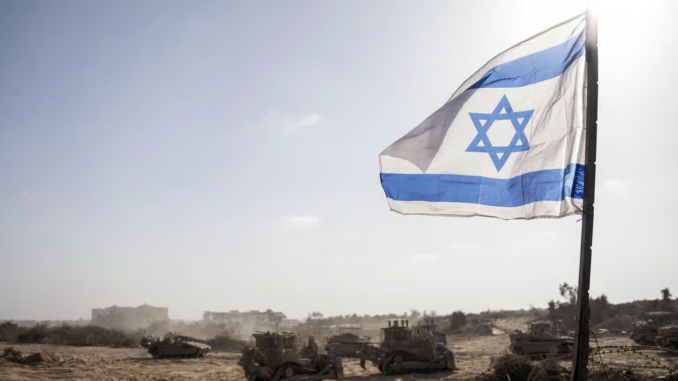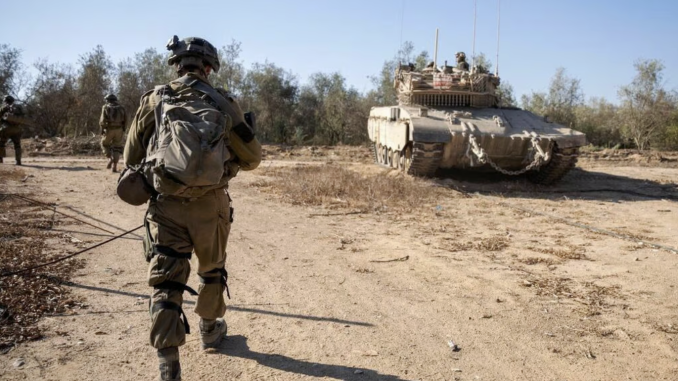Peloni: As American efforts are focused on ceasefire and negotiations, Israel is faced with a choice of victory or returning to some version of the status quo. The future will be an extension of which path will be pursued, and as Avivi notes, “It depends on our ability to persist and win.” There can be no substitute for victory, though the costs will be painful to bear.
‘Absolute victory’ is closer than ever, and it’s worth the heavy price according to the chairman of IDSF, who also outlines the flourishing of Israel on the day after
Brig. Gen. (Res.) Amir Avivi |
 Israeli flag in the Gaza Strip
Israeli flag in the Gaza Strip
(Photo: IDF)
The saying goes, “It’s always darkest before the dawn,” and right now, it feels like we are in that dark moment, awaiting the dawn. Certainly, the past year, and the past month in specific, have put us through deep darkness, with tears for the many fallen.
In addition, despite such successes as eliminating Yahya Sinwar and Hassan Nasrallah, we are still at war in Gaza and Lebanon, and constant fire from Lebanon still plagues our northern communities.
But at this very time, now that the lengthy, bloody fighting that’s upon us has greatly thinned the enemy’s ranks, it makes sense to climb above the perspective of our immediate troubles and comprehensively view the overall strategic picture. For the first time in many decades, Israel is in a position to defeat the Shiite axis that’s been assembling against it for generations. For the first time during this war, conditions have clearly been achieved for attaining our objectives in the south — for dissolving Hamas as a military and governmental entity and for returning all the hostages, while ensuring that Gaza will never harbor a terrorist army again.
In the north, thanks to the achievements of the IDF and the other security services, conditions now make progress possible — for the first time — on implementing Security Council Resolution 1559. That resolution calls for disbanding the Lebanese militias, Hezbollah included. A Lebanon that governs itself, without the presence of a terrorist army, is becoming a real prospect before our eyes. So as we take away the strategic depth that Iran built up, our security services are starting to shift their emphasis to tackling the threat from Iran itself. The clear understanding is that this war will be over only when the Iranian regime is overpowered and its nuclear intentions are put to an end.
In a single attack, Israel successfully wiped out Iran’s air defenses and obtained the necessary freedom of action for continuing to implement its plans until Iran’s military capabilities have been fully dismantled.
By severely damaging Iran’s air defense capability, Israel provided itself with operational freedom of action that can enable it to mount further operations in order to prevent Iran from obtaining nuclear weapons and other capabilities, and can ensure that Iran will pose no future threat to Israel. The nature and rapidity of those actions will be influenced largely by the results of the US elections and by the policies of the next US administration.
 (Photo: IDF)
(Photo: IDF)
Israel hopes that the new administration will be prepared to lead a military attack against Iran. An American-led coalition could create the conditions for an overthrow of the Ayatollahs’ regime.
The term “absolute victory” is now becoming realistic, and it can be clearly defined as the crumbling of the Shiite axis. The road ahead is still long, and sacrifice and determination are required in order to resist the temptation of agreements that would enable our enemies to rebuild their threat.
Years ago, when I was deputy commander of the Gaza Division, I often briefed foreign delegations on events in the Gaza Strip, and I often repeated the remark that since the days of the biblical Judges, the same dynamic has prevailed: the Gazans rise up against us, we rally the nation, a war is fought, and the cycle continues — until this day. But the Book of Judges ends some of the rounds of the cycle by writing: “And the land had rest forty years.” That sentence didn’t escape the notice of our sages, who asked why the Bible would emphasize forty quiet years during which apparently nothing happened. Apparently the answer is that in a contentious and battle-torn region like ours, quiet for forty years is really an exceptional event of Biblical proportions.
We too currently stand at a moment that could develop into such a long period of quiet. It depends on our ability to persist and win. The scope of the victory and the scope of the decisiveness will determine, in direct proportion, the quality and the time span of the golden age that Israel will experience on the Day After. On the Day After, peace agreements will be signed, the economy will flourish, mass immigration will commence, and so will a baby boom of the type that characterizes postwar years.
“All this is no fable and no dream,” as Naomi Shemer the songwriter predicted. All this is within reach and “true as the noontime light.” We need only to persist, to believe in unity, and simply to win.



Excellent analysis and recommendations by Avivi. Continuing the fight to total victory is a sine qua non for Israel’s for Israel’s peace and security,
Can anyone imagine how the world would have been changed if the wartime allies had proposed a cease-fire with Germany, or accepted such a proposal by the Nazis, to be followed up by an exhange of prisoners and a peace treaty:
When U.S. poet and lierary critic Ezra Pound, broadcasting over Radio Rome while fascist Italy was a t war with the United States, proposed exactly these terms for a negotiated peace treaty between the Axis powers and the Western Allies, the US, Britain and the Free French, he was indicted for treason by the U.S. and spent thirteen years in American jails, although his case never came up for trial.. Israeli leftists have published similar attacks on the their own government in the foreign press, together with proposals for a negotiated peace treaty with Israel’s worst enemies and an exchange of prisoners, The Israeli government has taken no action against them at all.